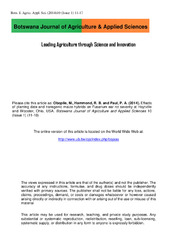| dc.contributor.author | Obopile, M. | |
| dc.contributor.author | Hammond, R. B. | |
| dc.contributor.author | Paul, P. A. | |
| dc.date.accessioned | 2019-09-25T07:53:03Z | |
| dc.date.accessioned | 2021-03-15T08:49:49Z | |
| dc.date.available | 2019-09-25T07:53:03Z | |
| dc.date.available | 2021-03-15T08:49:49Z | |
| dc.date.issued | 2014 | |
| dc.identifier.citation | Obopile, M., Hammond, R. B. and Paul, P. A. (2014). Effects of planting date and transgenic maize hybrids on Fusarium ear rot severity at Hoytville and Wooster, Ohio, USA. Botswana Journal of Agriculture and Applied Sciences 10 (Issue 1) (11-18) | en_US |
| dc.identifier.issn | 1815-5574 | |
| dc.identifier.uri | https://bojaas.buan.ac.bw/index.php/jaas | |
| dc.identifier.uri | http://moodle.buan.ac.bw:80/handle/123456789/210 | |
| dc.description | Original Research | en_US |
| dc.description.abstract | A three year study was conducted at Hoytville and Wooster, Ohio from 2006 to 2008 to find out how sequential planting of transgenic and non-transgenic maize influence Fusarium ear rot of maize. Maize hybrids with different maturities (short vs. long season), with and without Bacillus thuringiensis Berliner (Bt) gene were planted on different dates in late April/early May, late May and early June each year and the severity of ear rot caused by Fusarium fungal species were compared among planting dates and between maize genotypes. The study also investigated the association between European corn borer and Fusarium ear rot. A significant effect of planting date (P < 0.05) and the interaction with hybrid (P < 0.05) on Fusarium ear rot severity was only observed at Wooster in 2008. Transgenic Bt maize had significantly (P ≤ 0.05) lower severity of Fusarium ear rot than non-Bt hybrids in most cases during this study. A significant effect of hybrid maturity was only observed at Hoytville (P ≤ 0.05) in 2007 where higher severity was observed on late planted maize. The damage to maize kernels caused by European corn borer was significantly correlated (r2 = 0.29, P ≤ 0.01, to 0.43, P ≤ 0.001) with severity of Fusarium ear rot at both sites and in all years except in 2008 at Hoytville. The study showed that using Bt hybrids which vastly reduce kernel injury leads to reduced Fusarium ear rot severity. | en_US |
| dc.description.sponsorship | BUAN | en_US |
| dc.language.iso | en | en_US |
| dc.publisher | Botswana University of Agriculture and Natural resources | en_US |
| dc.relation.ispartofseries | Botswana Journal of Agriculture and Applied Sciences;Vol. 10 (Issue 1): 11-18 | |
| dc.subject | Bacillus thuringiensis | en_US |
| dc.subject | Relative maturity | en_US |
| dc.subject | Ostrinia nubilalis | en_US |
| dc.subject | Bt genotype | en_US |
| dc.title | Effects of planting date and transgenic maize hybrids on Fusarium ear rot severity at Hoytville and Wooster, Ohio, USA. | en_US |
| dc.type | Article | en_US |

